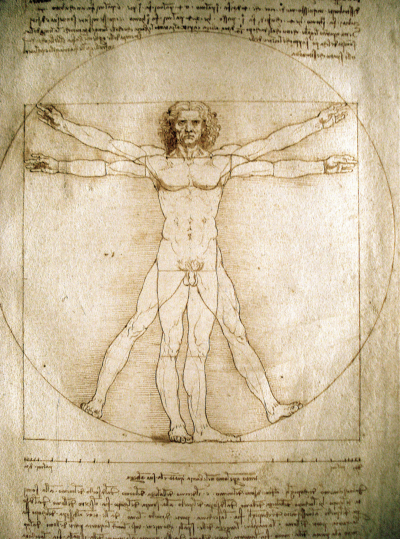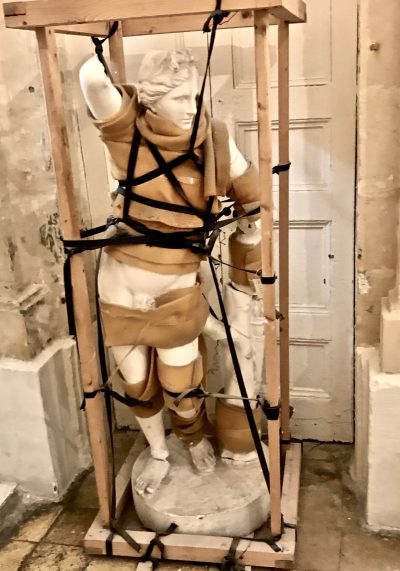Macro co-ordinates orienting the Oui!Learn learning community’s emerging pedagogy for 2018/2019

Vitruvian Man |

Post-Humanist Man |
Preamble
Overall, and perhaps rather over-simplistically, Oui!Learn’s pedagogy might be summarised as ‘learning how to let learn’, which is relevant both for oneself as teacher, allowing others ‘freedom’ to learn in their own way yet while still maintaining a pedagogical relationship, and oneself as learner, giving oneself permission to learn in ways that may not at first fit one’s preconceptions about what learning is. This is not at all simple as it concerns establishing and redefining conditions for learning, an act that is full of risks for closing down learning, while at the same time acknowledging the rhizomatic character of learning, that is, the capability to generate new contexts for understanding (again, rather over-simplistically expressed), at any moment in learning processes.
The central contention of the Oui!Learn community is that the university (or perhaps, ‘the idea of the university’) in the UK , in certain European countries and in the USA in the post-2007 period needs to re-assert its educational priorities as well as its democratic aspirations, acknowledging the ambiguities the term ‘democracy’ carries, over and against its need to meet the overweening (neo-conservative?, neo-liberal?) government agendas and in the wake of the transformation of a financial crash into a fiscal crisis (Tooze, 2018). It is also acknowledged that universities in the terrain or territories mentioned above may have irretrievably lost their motivation to be democratic within and to promote democracy without.
Part of this re-assertion, it is argued, involves engaging critically with the history of education, particularly higher education, in Europe (as a whole), ‘the West’ (beginning when?, meaning what?) and Western Europe, from notions of paideia, through humanitas to Bildung and towards post-anthropocentric, post-humanist pedagogies, in order to open up or to re-open those strands within it which have been submerged or overwritten and to re-appraise those parts which are simply hubristic, such as those expressed in the imperialism of techno-science over ‘nature’ and ‘society’ and in the self-regard of (the ‘eerily thin’, as Sedgwick notes) ‘Western’ ways of knowing, to the detriment of other epistemologies, ontologies and modes of existence.
A secondary, pragmatic part of this re-assertion involves clarifying the role of ‘the book’ and ’the library’, as archive and historically-delimited cultural and educational form, in providing a place of partnership and scholarly community, wherein human connection, creative expression and inner quiet and coherence (mindfulness) can be realised; a place where students need not be judged nor assessed, providing a sense of belonging (a) to a larger community and (b) to centuries-long scholarly conversation.
A tertiary part, which may at the same time be primary, concerns the question of ‘who’ and ‘how’: who is to be educated?; who is to educate?; how are the educatees and the educators to be brought together?; how is this bringing together, this gathering, to be organised? These questions relate to one that was raised at the end of the Oui!Learn presentation at the Learning and Teaching Symposium in June 2018: A comment from the floor suggested that all the systems of education about which we had been talking were for elites. How was our discussion and our learning community to contribute to the development of a ‘mass education system’?
This is a question which does require a response. The initial response has to be along the lines of: there is no ‘mass’ to be educated, only socially and historically situated people.
The question that immediately arises, given that people do not constitute a ‘mass’, no matter how apparently massive their number is: ‘Who are ‘the people’? Who are ‘they’ who are to be educated? Who are ‘they’ for whom (or on behalf of whom) education is organised, intended or meant? More problematically, are ‘the people’ a ‘they’? Why are ‘they’ not a ‘we’? The question may be: how are we to educate ourselves, about ourselves, in a way that is not autodidactic? How are we to open ourselves to ‘lessons’ or ‘learning’ other than those that take on a didactic form?
How is the ‘planning’ and the ‘designing’ of education, activities which are oriented towards ‘a time other than now’, to be understood?
Keywords: People; Education; Democracy; Europe; Great Recession; Anthropocene; Post-Humanism; Great Paradox; Learning Processes; Learning Cycles; Rhizomatic learning
The short narrative:
- Education* [Culture; Civilisation], deriving from, but surviving or living-on ‘beyond’, paideia, humanitas, Bildung, prepares people (as demos?; as ethnos?; as populus?) for participation in a democracy* (a polity, a civitas or an urban ; collective life, public life, a common world), within and against particular demographic* formations, acknowledging all its shortcomings as a form of order (kratia) and as a form of knowledge and reason (logos).
Education of whom: the people as a demos; the people as an ethnos; the people as a populus; or, indeed, the people as a laos?
2. Democracy, however, is an ideal or a goal that contains within it a central ambiguity about what is meant by ‘people’ (demos): it refers, at once and confusingly, to the few (aristoi) who decide, the many (hoi poloi) who accept and follow and the excluded (the uncounted, those who do not count, cannot be counted-in, cannot be taken into account).
3. This etymology brings to attention the Greek heritage and subsequent translations and transformation of the terms education (paideia, humanitas, Bildung) and the travails of democracy in relation to demos, polis, populus and the relation between civitas and urbs (the political, the civil and the urban), woven into the history of Europe* and its habitational forms and formats (habits, habitus, habitation), how it inhabits a world, defining it as ‘the’ world, a defined ‘savoir habiter’, knowing how to live, and knowing how to learn, savoir apprendre, and thus knowing how to learn to live, savoir apprendre habiter.
4. Neoliberal governance strategies inaugurated in the 1980s, under the guise of a developmental form of ‘liberal democracy’, have been re-asserted since the 2007 financial crash, as political opportunism re-configured that financial crash as a fiscal crisis. During the 2010s, after the Great Recession*, democracy has been captured by a revitalised neo-liberalism, meaning that education is seen as preparation for taking part in an economy (employability, the skills agenda), a concept which dominates conceptions of ‘reality’ through its ‘reality principles’, not a polity or civitas (political and civil society). The political capture of the higher educational agenda since 2007-2008 is discussed in John Holmwood’s (2018) review of Chris Newfield’s The Great Mistake. Newfield is talking about higher education in the USA but Holmwood makes the point that much of the argument is equally relevant to the UK. Holmwood writes:
“Newfield’s superb book describes the dismantling and privatization of US public higher education over the last decades, a process that accelerated after the 2008 financial crisis. He shows how politicians, policy analysts and university leaders in the US gave up the articulation of higher education as a public good in favour of its private benefits of investment in human capital and service to the corporate economy. This could just as easily be a description of the higher education debate in England since the Dearing Report (1997).”
5. To prevent education becoming wholly subsumed to this de-democratisation process, resilient responses to this renewed neo-liberal hegemony may be gathered under the heading post-Humanism* (critique of liberalism, critique of humanism, critique of Christian paideia, critique of Euro-centrism, critique of andro-centrism, critique of patriarchy, critique of critique, and so on), with its more-than-human and other-than-human ontologies, the strands of which take their inspiration from the avant-garde, protest, civil rights, women’s rights and ecological movements of the early, mid- and late-20th century, as well as prior socialisms, including so-called Romanticisms, arising in the 19th century.
6. Part of the post-Humanist (political) agenda (in an extended sense of ‘polis’) involves a recognition of the preponderance of humans in the balance of earthly life and the human experimentation in the chemistry of the planet’s atmosphere and oceans, to create a geological era named the Anthropocene*.
7. This gives rise to a set of paradoxes* (the Great Paradoxes*), paradoxes which constitute human ek-sistence or simply ek-sistence of which humanity is a part: although human beings experience their agency as having been overwhelmed by the ‘systems’ character of human life (socio-technical systems), such that the ‘human being’ is marginalised in various forms of self-identification, as a species (whatever the status of this concept) humanity has taken on greater significance for the future of the planet’s living systems, such that ecological interdependencies are reframed by the economic rationality of the socio-technical, which although ‘human’ in origin, but perhaps ‘naturally’ so, seems to have a trajectory of its own. This opens to the endlesss re-framing of ‘system’ and ‘critique’, (standing inside while construing the whole and passing judgement upon that symbolic-imaginary whole) in what may or may not form a series of interconnected learning processes or learning cycles interweaving the imaginary-symbolic assessments with the real that continually escapes them, but processes or cycles that are not ‘dialectical’ in any Hegelian or Marxian sense, and which differ also from the ‘disciplinary’ Destruktions and deconstructions of Heidegger and Derrida.
8. In this context, learning is considered ‘rhizomatic*’ (‘Jacob’s rhizome’) in as far as it can happen anywhere at any time about anything, yet this is a ‘spontaneity’ that is simultaneously a continuous, ongoing, contextualised ‘meditation’ upon the themes or imaginary-symbolic clusters of education, democracy, Europe, the Great Recession, the Anthropocene, post-Humanism, Neoliberalism, Great Paradoxes, Learning processes, Learning cycles. So an immediacy and a spontaneity that is not at all immediate or spontaneous.
9. Education, as learning to organise how to learn to teach how to learn and let learn (and to live and to let live), acknowledging its inescapably paradoxical character, for the educator (as organiser, as learner, there is never a simple role here) is similar to the paradoxes faced by the planner and the designer, all of whom, as organisers, are oriented to defining, representing or characterising a ‘present’ (a ‘present moment’), in terms of when and where it ‘takes place’, for whom, in what respect, in what form of appearance, in relation to a ‘past’ or ‘pasts’, from which it begins or departs, and a ‘future’ or ‘futures’, ‘yet to comes’, that remains to come as such phenomenal realities as educating, planning and designing are inexhaustible relational ek-sistents, towards which it is destined (but not as a destiny) or which serve simply as horizons (or, indeed, as verticalities which, in their precipitousness, may leave the organiser-learner/learner-teacher/teacher-learner vertiginous). To educate, to plan, to design, all seem to be anticipative or prospective, and to take place in a pre-emptive space, prior to ‘real’ practice, some kind of rehearsal space – yet they are equally real and equally practical.
References
Brown, W. (2011). The End of educated democracy. Representations, 116 (1), 19–41. Available from https://www.jstor.org/stable/10.1525/rep.2011.116.1.19 [Accessed 27 August 2018].
Holmwood, J. (2018). Inegalitarian populism and the university: British reflections on Newfield’s The Great Mistake: How We Wrecked Public Universities and How We Can Fix Them. British Journal of Sociology, 69 (2), 510–617. Available from http://doi.wiley.com/10.1111/1468-4446.12339 [Accessed 1 January 2019].
Miller, K.E. (2018). On being in libraries. Educause Review, 53 (5), 50–51. Available from http://auth.er.educause.edu/articles/2018/8/on-being-in-libraries#_zsLplKe1_zlDDm65 [Accessed 30 August 2018].
Tooze, A. (2018). Crashed: how a decade of financial crises changed the world. London, UK: Allen Lane.